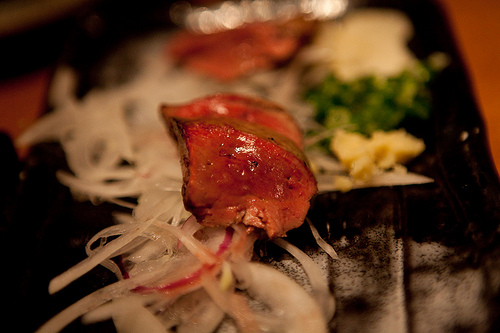The Japanese health ministry said Thursday it has detected E. coli O157 inside beef liver for the first time, raising the likelihood that raw liver — considered a delicacy in Japan — may soon be banned from the dining table.
The findings, to be discussed by a ministry council next Tuesday, come as the Ministry of Health, Labor and Welfare has been considering whether to prohibit butchers and restaurants from selling raw beef liver, in the wake of food poisoning deaths from raw beef served at barbeque restaurants earlier this year.
The ministry found live E. coli bacteria of the strain in the livers of two of the about 150 cattle it has  examined at meat inspection centers nationwide since summer.
examined at meat inspection centers nationwide since summer.
The ministry said the outcome of genetic testing has also shown that the bacteria existed inside beef livers of more than one cow examined.
So far, the bacteria have been found only on the surface of beef livers and the ministry had been warning consumers to be careful when eating raw livers.
Restaurants have already been asked by the government to refrain from serving raw beef liver since July while the ministry considered the safety of consuming raw beef and raw liver.
Of the 116 cases of food poisoning from eating raw beef liver confirmed between 1998 and 2010, 20 were caused by enterohemorrhagic E. coli bacteria, according to the ministry.
